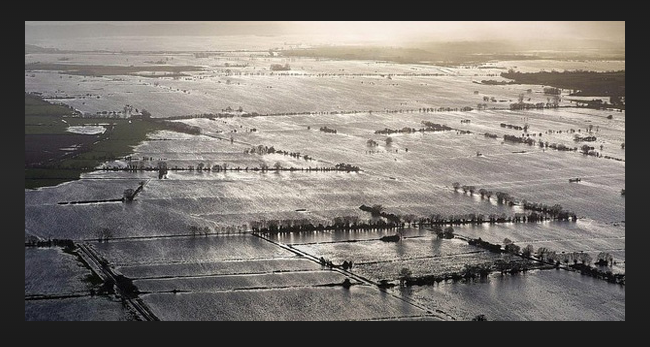21st Century Wire says…
The United Kingdom much like the United States has had a long foray with weather modification and cloud seeding programs…
Operation Cumulus also known as Operation Witch Doctor was apparently conducted between 1949 and 1952. Many believe that the Lynmouth flood of 1952 was caused by this particular military operation that led to some 34 deaths.
Vincent Schaefer and Irving Langmuir are said to be the very first chemists to effectively attempt cloud seeding in November of 1946.
Projects Cirrus and Stormfury have been linked to hurricane modification and conducted by the US Navy and Air Force.
The subject of weather control has come to the forefront after recent weather events this winter. Although it’s historically documented, it still remains a ‘no-go’ subject area for the mainstream media.
Instead, the MSM prefers to navel gaze, with the British press taking cheap swipes America’s ‘prepper’ culture.
The UK’s middle class propaganda arm, The Guardian Newspaper, released an article outlining the benefits of survivalism in response to this year’s extreme weather conditions, entitled, Is it time to join the ‘preppers’? How to survive the climate-change apocalypse, the article (below) appears to be a not-so-clever attempt at knocking those who are in favor of individual sovereignty and those who choose to prepare for major catastrophes, whether those events are engineered or not. Most importantly, writer Leo Benedictus doesn’t miss the chance to tether his intellectual life raft to the modern mythology known popularly as “climate change” and link that fiction to a story of Noah’s Ark. This is what passes for journalism in Britain these days:
“We are getting close to what might be called The Noah Scenario. Last month was the wettest January in Britain since records began in 1767(…)… Climate change may be a gradual process, but people who live on the Somerset Levels or the banks of the Thames are getting a very sudden education in the value of arks.”
Climate change and Noah’s Ark? Interesting mix, for a high school creative writing class, maybe. And by the way, the flooding in Somerset, England has nothing to do with ‘climate change’, and everything to do with changes in waterway and land management engineering and policy. But lets not let facts get in the way of a good climate change story…
Other recent examples used to demonize being self-prepared have come from bloated news networks like CNN and the over dramatized Doomsday Prepper show featured on the National Geographic channel.
That said, deceptive propaganda pieces like what the Guardian just released, that brow-beat the reader into continuing their sleepy journey through modern life, are concealing the reality – that maybe the best practice is to be more self-reliant.
There is no doubt that weighty Hollywood films like Darren Afronsky’s epic-biblical depiction Noah, will also impact this conversation, as those in neo-liberal circles should have a field day…

IMAGE: Recent flooding seen in Somerset, UK.
Is it time to join the ‘preppers’? How to survive the climate-change apocalypse
The Guardian
Leo Benedictus
We are getting close to what might be called The Noah Scenario. Last month was the wettest January in Britain since records began in 1767. So far this month has been no different, and the Met Office expects the wind and rain to continue until March. Climate change may be a gradual process, but people who live on the Somerset Levels or the banks of the Thames are getting a very sudden education in the value of arks.
It’s unlikely that these floods will be the last such catastrophe, or the worst. Climate scientists expect bigger and more frequent extreme weather events throughout the coming century – not just wind and rain, but droughts as well. Nor is weather the only danger: pandemic flu, nuclear weapons, antibiotic resistance, environmental catastrophe and chronic food shortages could also offer dire threats to civilisation as we know it. You might not want to panic just yet, but you might decide that it is time to join the “preppers” – people who are secretly preparing to abandon modern life when the apocalypse, in whatever form, does arrive.
When you have no choice. When soldiers are on your street, your neighbours have begun to steal from you and plague-sufferers are camped in your drive – or perhaps slightly before all that. Preppers have a catch-all term for this moment: the SHTF scenario, in reference to the day when the Shit finally does Hit The Fan.
“It would be the last resort for me,” says Steve, a 57-year-old prepper from Essex, who runs ukpreppersguide.co.uk. “Some people seem to think it’s the first thing to do. The moment something happens, they grab their rucksack and off they go and live in the wild – but if you’ve ever tried that, it really isn’t easy. Where I am at the moment, I probably have enough provisions to survive for about nine months. That doesn’t include going out and getting your own food.”
When the moment comes, however, you may not have much warning, so it is important to keep what preppers call a “bug-out bag” ready at all times. Ideally, you’d leave at night, when you won’t be followed. “The idea behind leaving your home is to get away from danger,” Steve explains, “which means getting away from everybody and going under the radar, off-grid, so you can’t be found – then just survive for however long is needed before you can come back to civilisation.”
If you’re worried about rain, Suffolk is Britain’s driest county. But there you’ll have to worry about the sea instead. Next driest is Bedfordshire, although it is also quite an expensive place to buy a house, while society still functions, so Nottinghamshire or Northamptonshire might be better if you’re surviving on a budget. Be sure to have plenty of water butts in any of these places.
Alternatively, it might be simpler to live somewhere wet, but higher up. Each outbreak of catastrophic flooding brings with it a quieter outbreak of people feeling smug on hills, which never flood, and offer a good defensive position should you come under attack from hordes of wet, hungry or diseased people. Cumbria, Wales and the Western Highlands are some of the wettest parts of the UK. They are also very hilly, not too expensive, and reasonably remote from population centres, which makes them perfect for your purposes.
A quick word on the windiness of hills. This can be a good thing, allowing you to generate your own electricity if you put up a turbine. If you are worried about storm damage, however, then you will want to give thought to exactly where your house should be. “Our prevailing weather comes from the west,” explains Nicola Maxey from the Met Office, “so if you’re on the east side of a hill you’re going to be protected from the prevailing winds.” Thus located, with several months of food, electricity and water-purification supplies, your house should be a good place to wait for calamity to pass.
Continue this liberal propaganda article at the Guardian
READ MORE CLIMATE CHANGE NEWS AT: 21st Century Wire Climate Change Files















